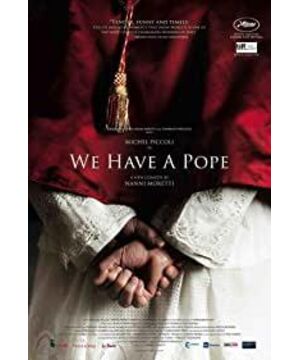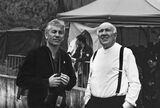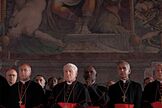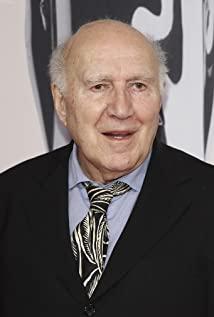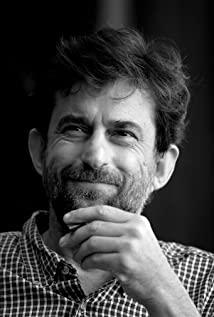Through a Papa who is reluctant to take on the title of "Pope", he tries to spy on what Papa, who is the same person as the world, is stripped of the "Pope" symbol. Of course, there are also bishops, church speakers, and even the splendid and cool palaces of the Vatican, the curtains of the Holy Father's room, who have stripped away religious symbols. Papa's portrayal is full of hints. As the supreme leader of the church, he gave the church a blow, and this blow shattered the sanctified image that Christianity had worked hard to maintain for 1300 years. Of all the films that dismantle the deity of religion (such as "The Da Vinci Code" and "Sherlock Holmes 1", which are popular Hollywood commercials with gimmicks that dismantle the deity of religion), "The Birth of the Pope" is closer to the flesh. Because he did not have the process of sanctification from the very beginning, but based on people's actual cognition, he began to conduct individual research on the de-sanctification of the sacred center. When Nanni Moretti appeared in the Pope's palace as a psychology professor, I couldn't help laughing at his intentions. But Nanny has no intention of dismantling religion with psychoanalysis, he just wants the two to collide, and then each exposes their own helplessness and incompetence, but here Papa is more helpless in the position of a seeker, while Nanny is more helpless. Due to the limitations of his own thinking form, Papa's three-day tracking of disappearance is equivalent to making a psychoanalytic report as he imagined.
Nanny is lively at heart, straightforward, confident, competitive and worldly entertaining like a typical Italian man. In the film, he played cards, taught, and played volleyball in groups for the bishops. Like a father, he taught these children who had never grown up in the Bible how to accept the secular preferences of their nature and how to treat themselves scientifically. He was not harsh at all, even gentle and compassionate. (I believe this attitude is not just because it takes into account the reality of the Vatican and the feelings of the faithful). I can't imagine how tragic it would have been if the same subject matter fell into the hands of Marco Bellocchio in his early years. But these Italian directors have a wonderful thing in common, that is, they all like to find answers in the culture (perhaps it is the innate literary style of the whole national character). For the beauty in culture, they have emotional sustenance beyond reality and even religious sense. This kind of sustenance is so illusory and beautiful, it even carries the meaning of life. Looking back at Papa, since it was not God (it was Chekhov) who carried his good original memory, Nanny's intention was clear. Although he didn't want to induce the decline of Christianity, Papa feels lost like all modern people, and even searching for the happy fragments of memory is not for healing, and Papa's final decision was doomed from the beginning.
View more about We Have a Pope reviews


